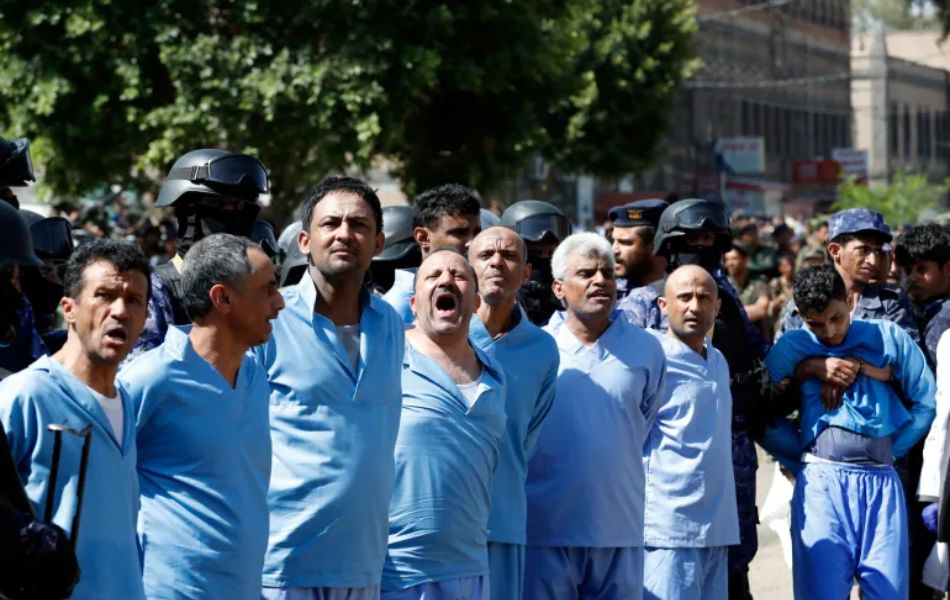
Geneva – SAM Organization for Rights and Freedoms stated that the mass execution crime that took place in the capital, Sana’a, on September 18, 2021, represents one of the most heinous violations in Yemen’s modern history. The de facto authorities carried out the execution of nine citizens in Tahrir Square, while the tenth victim had already perished under torture and enforced disappearance. The organization emphasized that what occurred was not a legitimate judicial ruling but a bloody spectacle in which the victims’ bodies were used as a tool for political intimidation, broadcast live in a blatant violation of human dignity and the right to life.
The organization confirmed that the case was marred by grave violations at all stages, starting with invalid arrest warrants, arbitrary detentions, and enforced disappearances in unofficial locations. The victims were deprived of their right to defense and access to lawyers, subjected to physical and psychological torture to extract fabricated confessions, and then referred to an exceptional court lacking independence and impartiality, which issued predetermined verdicts. The organization added that the entire trial was legally void, constituting an extrajudicial execution and a crime against humanity that does not lapse with time, in clear violation of the Yemeni Constitution and international conventions binding on Yemen.
SAM stressed that the public killing was not merely the execution of an unjust verdict but a vengeful political message targeting the entire society, aimed at portraying the judiciary as a tool of oppression rather than justice. The organization noted that the victims’ families paid a heavy price, enduring years of pain and suffering before being struck with the devastating sight of their loved ones’ lives being taken publicly, which deepened the loss of trust in the judiciary and instilled fear in society.
The organization further highlighted that the victims were not the only ones who paid the price; their families endured years of anguish and waiting, only to be confronted with the horrific spectacle of their loved ones’ lives being snuffed out before cameras. Children grew up with memories of their fathers being unjustly killed, women were forcibly widowed, and mothers witnessed their sons’ blood being shed publicly. This human suffering affected not only the families but the entire society, sowing fear, undermining what remained of trust in the judiciary, and confirming that when justice is hijacked, it becomes a tool of vengeance rather than a means to protect rights.
SAM emphasized that this crime underscores the urgent need for a serious and broad discussion on the independence of the judiciary as the fundamental guarantee of citizens’ rights and their protection from the abuse of power and entanglement in political conflicts. The collapse and hijacking of the judiciary open the door wide to impunity and strip societies of their safety valve. In the same context, the organization stressed the necessity of reforming the national legal system, which remains burdened with vague provisions used to legitimize political executions and interpreted to serve the interests of the dominant powers. The persistence of such provisions as a tool in the hands of authority and influence perpetuates the transformation of the law into a cover for killing. This makes a radical review and comprehensive overhaul of the legal system an urgent necessity to restore the law’s original function of protecting human dignity, upholding justice, and establishing the judiciary as an impartial and independent arbiter.
The organization considered this crime a warning bell regarding the dangers of the judiciary’s collapse and its capture by authorities, which paves the way for impunity and undermines the fundamental guarantees of rights protection. It pointed out that there is now an urgent need for a radical and comprehensive reform of the national legal system, which remains encumbered by loose provisions that legitimize political killings and serve the interests of controlling powers.
In conclusion, SAM affirmed that the crime of September 18 will remain a living testament to a dark chapter in Yemen’s history. The blood of the innocent spilled in Tahrir Square will remain a scar on the face of justice, removable only through accountability and redress, documenting these violations in the national memory, and holding perpetrators accountable locally or under the principle of universal jurisdiction.